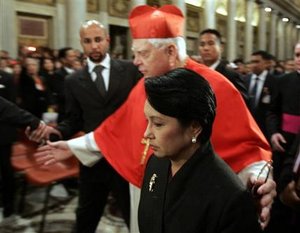Bernard Cardinal Law
|
|
His Eminence Bernard Cardinal Law, born as Bernard Francis Law (born November 4, 1931 in Torreon, Mexico) is a bishop of the Roman Catholic Church in the United States and created a cardinal in consistory by Pope John Paul II. He is currently the archpriest of the Basilica di Santa Maria Maggiore and a member of the Roman Curia that governs the Universal Church.
In 1984, Cardinal Law was appointed Archbishop of Boston, prelate bishop of the Archdiocese of Boston. On May 25, 1985, he was elevated in consistory as a member of the College of Cardinals. After his resignation as Archbishop of Boston on December 13, 2002, Pope John Paul II appointed Cardinal Law to several authoritative positions in Rome and the Vatican City.
Sex scandal
Cardinal Law's reign as Archbishop of Boston began in popularity but quickly declined into turbulence towards the end of his term. Allegations and reports of sexual misconduct by priests of the Archdiocese of Boston became widespread causing Roman Catholics in other dioceses of the United States to investigate similar situations there. Cardinal Law's actions and inactions prompted public scrutiny of all members of the United States Conference of Catholic Bishops and the steps they've taken in response to past and current allegations of sexual misconduct at the hands of priests. The events in the Archdiocese of Boston exploded into a national Roman Catholic Church sex abuse scandal.
Grassroots public advocacy groups like Voice of the Faithful hounded Cardinal Law after documents revealed his extensive role in covering up incidents of sexual misconduct of his priests. In one case, Cardinal Law moved Father Paul Shanley from parish to parish despite repeated allegations of molestation of children under the priest's care. Later, it was discovered that Father Shanley even advocated the North American Man-Boy Love Association. In his own defense, Cardinal Law claimed he made the mistake of not keeping proper records.
The cardinal said his practice was to seek the analysis of psychiatrists, clinicians, and therapists in residential treatment centers before deciding whether a priest accused of sexually abusing a child should be returned to the pulpit.
As a result of the widespread sex scandal, the Archdiocese of Boston lost millions of dollars in fines and settlements. It also funded the legal defense of accused priests. Devout members of the Roman Catholic Church refrained from making new donations and the archdiocese slipped into large financial deficits. Over 50 priests signed a letter declaring no confidence in Law and asking him to resign - something that had never before happened in the history of the Church in America. The Archdiocese was forced to close 65 parishes before Cardinal Law stepped down from service.
Curial appointments
Prompted by public calls, Cardinal Law resigned as Archbishop of Boston, despite the support of his pastoral work by Pope John Paul II. The pope reassigned the Cardinal to several administrative posts of the Roman Curia and named him as archpriest of the Basilica di Santa Maria Maggiore, one of the five major basilicas of the Roman Catholic Church.
After the death and funeral of Pope John Paul II, Joseph Cardinal Ratzinger, Dean of the College of Cardinals (and later to become John Paul II's successor as Pope Benedict XVI), gave Cardinal Law the honor of celebrating one of nine official Vatican masses during the nine official days of mourning. Several advocacy groups, such as the Survivors Network of Those Abused By Priests (SNAP) and Voice of the Fatithful, protested and questioned that duty given to Cardinal Law, suggesting that it showed a lack of respect for the abuse victims and serves as a prime example of the Roman Catholic's treatment of abusive priests.
As a member of the College of Cardinals under the age of 80, Law was also one of the cardinal electors who participated in the 2005 papal conclave that selected Pope Benedict XVI as successor to John Paul.
Resources
- ZachEverson.com (http://www.zacheverson.com/Op-Ed/National/scarlet_cardinal_law.htm)
- The Boston Globe (http://www.boston.com/globe/spotlight/abuse/)de:Bernard Francis Law

